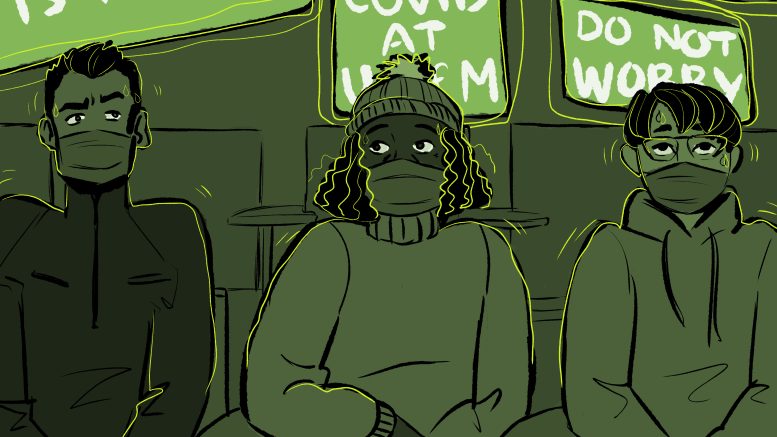The University of Manitoba officially announced a large portion of classes will return to in-person teaching beginning Feb. 28. This comes after the university made the decision to halt its plans to return at the beginning of the winter semester due to the cascading number of COVID-19 cases during the holidays. Although numbers are beginning to plateau across Canada, students have expressed concerns about returning to class.
The unfortunate truth is that the most equitable way to deliver education is by universally delivering it online for the remainder of the semester while details are hashed out during the summer for a return in the fall of 2022. By abruptly dropping news on students that they will be forced to return in-person or drop their classes, the U of M is suggesting education will no longer be accessible for people who are immunocompromised.
Regardless of the severity of each case, a minor bout of COVID is still no walk in the park. Over the holidays, I contracted COVID-19 and isolated with my partner. It started with trembling cold shakes and progressed to body aches and back pain in the evening. By the morning I had a moderate fever, a splitting headache, was physically exhausted and could barely breathe without wheezing and coughing. On one day I seriously considered seeing a doctor out of fear that my case was transitioning into pneumonia. Thankfully, my condition began to improve the following day.
I was lucky enough to have contracted COVID-19 while both of my jobs and school were on break for the holidays. Nonetheless, I still had dozens of papers to grade which I planned on completing before finals week arrived — I had a few final papers to write myself. Because I caught COVID-19, I was heavily debilitated in my ability to work for a week. I spent all day and night the next three weeks playing catch-up with my deadlines. Beyond this, I still have a residual cough that keeps me from getting the proper rest I need to accommodate my schedule.
By forcing students back to in-person classes, the U of M is insinuating students need to prioritize their education over their physical health. However, speaking from personal experience, it simply doesn’t work that way. Imagine that my COVID-19 case was the best-case scenario — how might this decision affect those who have suppressed immune systems? Further, some students cannot afford to delay their graduation due to expensive student loans. The U of M is forcing both students who are immunocompromised and financially disadvantaged to decide between bad and worse options — to lose out on necessary income or risk their lives.
The U of M’s decision comes after notable opposition at various other Canadian universities that opted to force students back to in-person learning. A recent survey at Concordia University showed 78 per cent of teaching and research assistants didn’t feel a return to in-person classes was appropriate. A further 88 per cent thought the university should distribute N95 masks on campus to ensure better safety. However, the university doesn’t seem to be taking these concerns seriously and the student union has taken it upon itself to spend thousands of dollars to distribute better-quality face masks.
Further, students across Canada have staged walkouts and signed petitions in opposition to in-person classes. A petition at Ryerson University to maintain online options for students garnered more than 11,000 signatures — nearly one quarter of Ryerson’s student population.
The U of M has not been without opposition, either. The faculty of law recently opted to remain online after a survey indicated more than 51 per cent of students preferred it, 24 per cent desired a hybrid model and another 25 per cent wanted to return to in-person classes. Although the survey only received 251 responses, it is still clear the majority of students do not want to return to in-person classes.
Yet many faculties will not be afforded the same flexibility as law students. As an email distributed by the U of M administration says, “Some staff will be required to return to campus to support in-person academic activities.”
The administration seems to be banking on the fact that all students returning must be fully vaccinated. “We have listened to a range of perspectives on the matter of our operations and believe this approach is the most prudent given UM’s mandatory vaccine policy, stringent COVID protocols and commitment to an outstanding student experience,” president and vice-chancellor Michael Benarroch announced in the email. However, vaccination should not be a valid reason to return to in-person classes. If vaccinated people can’t see a movie at full capacity, why should a class that consists of hundreds of students be allowed to return? The safety protocols and size of venues are virtually the same.
The U of M is ignoring a vocal majority. The options are clear for the administration: either provide students a choice with hybrid classes or prioritize planning a return for the upcoming fall semester instead. If the U of M doesn’t, students must be prepared to oppose the administration’s unsafe return to in-person classes.



